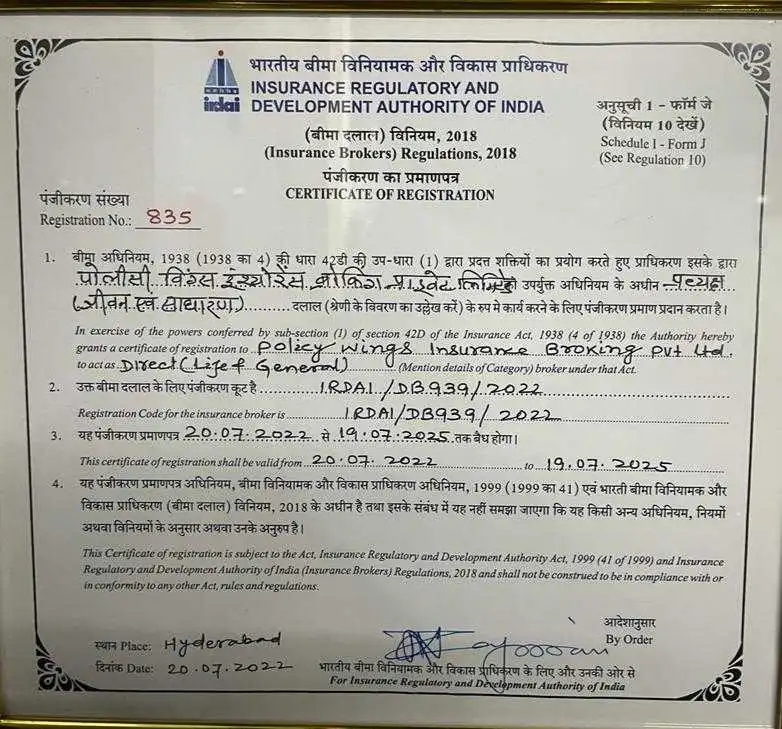Car Insurance
Cheapest car insurance in India
fIf you’ve ever been in a car accident and find yourself needing to repair or replace your vehicle, you know how costly that can be. It can cost several thousand rupees to do so, depending on the extent of the damage. The provider cheapest insurance for car offer some very affordable options for comprehensive coverage, which should help ensure the safety of you and your prized travel buddy when venturing out on the road.
This article will offer everything you need to know about online insurance for car in India.
What exactly is Car Insurance?
The cheapest insurance for car or we can simply say a car insurance plan is a legally binding agreement between the policyholder and the insurance provider in exchange for a payment. It safeguards the insured from financial loss in the event of an automobile accident or other unpleasant events. The damage caused by the collision might be to the policyholder’s car or to someone else’s property or car, for which the policyholder is legally required to compensate. Both these expenses are covered by car insurance policies in India.
What are the types of Car Insurance?
Online insurance for car plans can be primarily divided into six broad types:

To travel by your car on Indian roads, you must have proper third-party insurance coverage, according to the 1988 Motor Vehicles Act. A third-party liability insurance coverage covers policyholders against claims made by any third party during a car accident. However, it should be noted that this plan does not cover any damage to the insured car or the policyholder

A comprehensive insurance policy covers any damage to the covered vehicle as well as third-party claims. It also protects the policyholder’s automobile against fire, theft, and natural disasters.

A standalone own damage insurance policy solely covers the damage done to the insured vehicle in the event of an accident, natural catastrophe, fire, or theft. However, it is crucial to note that a standalone own damage coverage is only effective if the insured vehicle has active third-party liability coverage.

The IRDAI ordered that all purchased cars need to have a minimum of three-year third-party coverage beginning September 1, 2018. Therefore, these plans are getting popular. As the name suggests, 1+3 Bundled plans offer 1 year of standalone own damage coverage and 3 years of third-party liability insurance coverage.

Motor Floater insurance coverage covers all the cars owned by a single policyholder under one insurance policy. It helps to keep the insurance premium amount in check.

PAYD or pay-as-you-drive insurance coverage is a kind of top-up insurance coverage where the policyholder is required to pay depending on how much the car is driven over the coverage period.
Based on the type of car insured, car insurance can be divided into these subtypes:
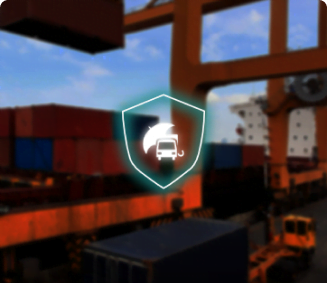
Commercial vehicle insurance is designed to provide coverage for corporate-owned vehicles in India.
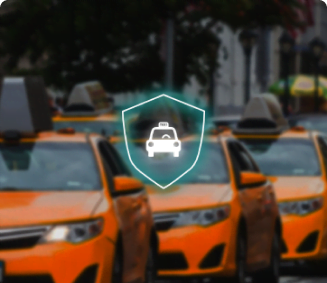
Taxi Insurance provides coverage to taxi owners in India. Most companies offer motor floater insurance coverage to policyholders, who can use this service if they own multiple taxis.

Two-wheeler insurance or bike insurance can provide protection for your two-wheeler in case of an accident. Third-party bike insurance is mandatory for two-wheelers.
Why should I Buy Car Insurance?
If you are the kind of person who is still making up your mind if you should have a car insurance plan, here is why you should buy one.
- Peace of Mind: As the old saying goes where prevention is considered to be much better than cure. That’s true with many things in life – especially when it comes to third party liability insurance or car insurance. Buying car insurance can be one of the best decisions you’re ever going to make. It could save you money, protect your vehicle and give you peace of mind knowing that if anything were to happen to it, you would receive compensation.
- Save Repairing Expenses: Over the years, online insurance for car has become an absolute necessity for all motorists. With the rise in accidents and fatalities on our roads, it is better to ensure that you have a good cover for your car. Add to that the rising cost of repairing vehicles, and you will understand why having an insurance policy is so important.
- Mandatory Coverage: Everyone who drives a car is responsible for being insured. Being responsible, you will surely want to protect yourself against accidents and make sure that you are safe in case something unwanted happens. The government mandates you to have a minimum of third-party liability automobile insurance. Being a responsible and law-abiding Indian citizen protects you against fines and other legal entanglements.
What are the Car Insurance add-ons?
Add-on car insurance coverage is optional and can be added to your basic insurance plan by the insurer. In case you wish to get more coverage from your insurance provider, then here are the common add-ons available for car insurance plans:
1. Engine Protection Coverage: A basic car insurance plan, that doesn’t cover things like engine technical breakdown and oil spills. You want your vehicle to be safe, for travel and for you. That is why Engine Protection Coverage is so important to have when you insure a car.
2. Zero Depreciation Coverage: Zero depreciation bike or car coverage helps you receive a higher claim amount by bearing the weight of the vehicle’s depreciation.
3. NCB Coverage: No Claim Bonus add-on coverage guarantees that you will receive your NCB discount each year, even if you made claims in the previous year. For the first year, the NCB discount rate is 20%, increasing to 50% for the fifth year in a row.
4. Return to Invoice Coverage: The loss of value is a regular issue for new automobile owners. The moment you take your new automobile out of the showroom, it starts to depreciate as well as lose value. This add-on ensures an insurance claim for the overall invoice amount in the case of total or partial theft or loss of the automobile.
5. Emergency Assistance Coverage: Emergency Assistance Coverage includes on-the-spot roadside assistance. A technician will be dispatched with a single call to the insurance company.
How to file Car Insurance Claims?
When you incur a loss, you would like to settle the claim as soon as possible. But if you have not dealt with insurance companies in the past, you may find yourself confused about the process of filing for cashless and reimbursement insurance claims.
Cashless Claims
- Enquire your insurance provider about your local cashless garages.
- Visit a local garage authorised by your insurance provider for cashless claims.
- Inform your insurance provider about the claim.
- A surveyor would evaluate your vehicle and approve your claim.
- The garage will repair your car and the insurance company will pay their bills.
- In case of a partial cashless claim, you will have to pay the remaining amount before leaving with your car.
Reimbursement Claims
- Inform your insurance provider about the claim.
- A surveyor would evaluate your vehicle and approve your claim.
- Once approved, you can visit any local garage and get your car fixed.
- You need to pay the garage fees.
- Then, you have to send the claim document along with the repair bills and other relevant paperwork.
- The insurance company will reimburse your claim amount.
What is included in car insurance?
The comprehensive coverage of your car is an important aspect of car insurance. In the case of car accidents, comprehensive coverage makes sure that you come out unscathed. Here’s a list of things covered under a comprehensive auto insurance plan.
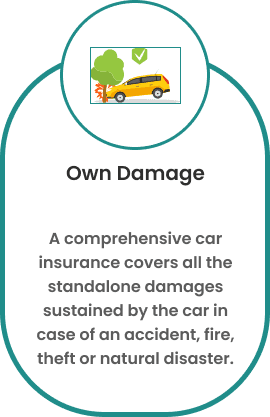
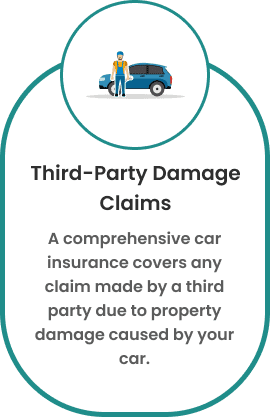
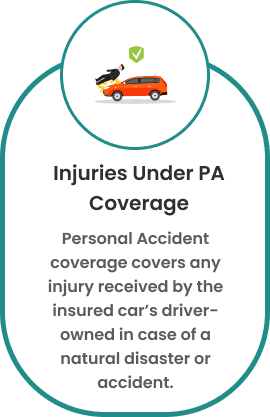
What is not included in car insurance?
Understanding the exclusions in a car insurance policy can help you to make an informed choice. Here is a list of common car insurance exclusions.
Damage was sustained when the car was used for purposes not covered by the insurance coverage.
- Damage sustained while travelling outside of the nation or during warfare.
- Problems with the car’s ordinary wear and tear.
- Damage produced by a driver who is either intoxicated or doesn’t have a proper driving licence.
- Mechanical failure and component wear
Best Car Insurance Companies
The car insurance or we can say even the cheapest car insurance in India deals can be quite confusing at times. There are thousands of companies that offer the same insurance coverage, but some of them offer cheapest insurance for car in India than others. If you are in the market looking for the best car insurance companies, here are some you should consider.

Bajaj Allianz
Car Insurance Policy
Car Insurance Policy
Bajaj Allianz
Claim Ratio : 62%

New India
Private Car Insurance Policy
Private Car Insurance Policy
New India
Claim Ratio : 87.54%

HDFC ERGO
Private Car Insurance Policy
Private Car Insurance Policy
HDFC ERGO
Claim Ratio : 82%

IFFCO Tokio
Car Insurance Policy
Car Insurance Policy
IFFCO Tokio
Claim Ratio : 87%
Reliance
Car Insurance Policy
Car Insurance Policy
Reliance
Claim Ratio : 85%
The Bottom Line
Hopefully you will be able to find an important car insurance policy that fits your needs. By staying informed of all the different car insurance policies available, you will stand a greater chance at being confident with the choice you make. Although there are many to be had, don’t let that make your search difficult. After all, finding the cheapest car insurance in India yet the best car insurance policy is not something that you have to worry about.
Frequently Asked Questions
An insurance company's claim ratio or claim settlement ratio is a measure used to assess its reliability. It is calculated by dividing the overall number of resolved claims by the overall amount of claims filed to the motor insurance company.
When it comes to choosing the company which provides best and the cheapest insurance for car in India, there is no one company which stands out. It all depends on who you are and your insurance requirements. The easiest way to go about it would be to compare various policies and pick one according to your needs.
According to the 1988 Motor Vehicles Act in India, all vehicles operating in any public area must have automobile vehicle insurance coverage. Even if they choose the basic insurance plans, policyholders should have a minimum of third party liability coverage.
Latest Blogs
You can protect yourself in the event that something goes wrong while you’re traveling by getting a travel insurance plan. Medical crises, misplaced luggage trip cancellations and delays are all covered. Having the appropriate travel insurance plan provides you with peace of mind whether you are taking a short weekend getaway business trip or vacation. It ensures that you don’t suffer significant financial losses in the event of unforeseen issues. Because every trip is unique, it’s critical to select a plan that works for you. We will explain how to choose the best travel insurance for any type of trip in this guide. Know What Travel Insurance Typically Covers Medical emergencies and hospitalization Travel insurance plan online assists in covering medical bills or hospital stays in the event that you become ill or are hurt while traveling. It can pay for tests, medications operations and even ambulance fees. If you’re going to a place where healthcare is expensive or unknown this is crucial. Trip cancellations or delays Your pre-paid expenses may be refunded by your travel insurance if you have to cancel your trip for any major reason such as illness or an accident. In the event that your flight is delayed or you miss a connection it also helps by paying for additional hotel stays, meals and other urgent costs while you wait. Lost luggage and personal belongings A travel insurance plan online can assist you in purchasing necessities like clothing or toiletries in the event that your luggage is delayed, lost or stolen. Depending on the restrictions and terms of your plan it might also pay for the replacement of valuables like your passport electronics or travel documents. Accidental death or dismemberment If you pass away in an accident while traveling this portion of the policy provides your family with financial support. In addition you might receive a lump sum payment if you sustain a serious injury, lose a limb or lose your sight. For the worst it serves as a safety net. Emergency evacuation and repatriation This coverage is useful in the event of a natural disaster, political upheaval or medical emergency that requires you to be transported to a safer location or returned to your nation of origin. It ensures your safe return by covering the cost of transportation whether it be by air ambulance or a special flight. Consider Add-On Coverage Options Depending on your needs, basic travel insurance might not always be sufficient. Add-on coverage options come in handy at that point. Depending on your activities, health or possessions you can add these additional protections to your plan. Coverage of adventure sports. Regular insurance might not cover injuries from sports like trekking, scuba diving or skiing if you intend to engage in these activities. Coverage for adventure sports protects you while engaging in high-risk activities and covers medical expenses in the event of an injury. Protection against COVID-19. This add-on covers COVID-19-related expenses including testing treatment quarantine and even trip cancellations in the event that you or a family member test positive. When traveling abroad where regulations can change at any time its extremely helpful. Protection against pre-existing medical conditions. Treatment for pre-existing conditions such as diabetes or heart problems can be covered while traveling with this option. Claims for such conditions could be denied without it. Coverage for rental cars electronics etc. If you misplace or break your phone laptop or camera this add-on can help. It also includes coverage for rental car damage. This is a wise addition if you’re renting a car or carrying bulky equipment. Compare Plans from Different Insurers Comparing plans from various companies is a wise move before purchasing a travel insurance plan online. This enables you to locate the best coverage at a reasonable cost. Make use of comparative websites or applications:– Compare travel insurance plans quickly by using reputable websites or apps. By displaying costs, features and advantages side by side they help you save time and effort. Examine the premiums exclusions and coverage limits:- Examine the premium (cost) the coverage amount and the exclusions on each plan. A low-cost plan might overlook crucial safeguards. Examine client feedback and claim settlement percentages:– See what other customers have to say about the business’s services. Check the company’s claim approval rate as well:- You have a better chance of receiving your money back when you need it if the claim settlement ratio is higher. Check Policy Exclusions and Limitations Always read the exclusions from a travel insurance plan online before purchasing one. This keeps you from being caught off guard when you make a claim later. Activities that are not covered:- Risky sports like skydiving, scuba diving and mountain climbing are often excluded from insurance plans. You might require specialized add-on coverage if you intend to participate in adventure sports. Pre-existing conditions:- Treatment for pre-existing conditions like diabetes or asthma is typically not covered by basic plans. For these circumstances you might need to purchase additional coverage. Specific countries or regions not covered:- Certain nations or regions might not be covered by the policy particularly if there are travel advisories about war or hazardous conditions. Always confirm that the coverage includes the place you are going. Understand the Claims Process In the event that something goes wrong while you are traveling it is crucial to know how to submit a claim. Here’s what you should remember. Documents are needed. Keep all tickets, reports, invoices and receipts secure. They must provide documentation of your loss such as police reports for misplaced property or medical bills. The period within which claims must be filed. After the incident you have a set period of time (usually 7 to 30 days) to submit your claim to the majority of insurance companies. On-time submission is crucial. Contact details for emergency situations. Never forget the insurer’s emergency number or helpline. In the event of a medical emergency or other pressing circumstance give them
...Let’s face it—we have all been there. That sinking feeling when a great employee walks into your office and says, “I’m putting in my notice.” It stings, does not it? Especially when it’s someone you have trained, someone who knows your systems inside out, someone who brought real value. We have experienced that exact moment more than once. And like you, we have asked ourselves—what more could we have done? See, the workplace has changed. People no longer stick around just for a paycheck. What they want is something deeper—security, empathy and a real sense that their employer values them not just as workers, but as people. That’s when we realized how critical Group Health Insurance is when it comes to keeping our team loyal, satisfied and motivated. You may be thinking, “Health insurance? Is not that just a checkbox benefit?” Not quite. Stick with us here, because once we truly understood how group health insurance works—not just as a policy but as a strategy—employee retention became so much easier. Cool, right? Let’s explore why this benefit has become our secret weapon in retaining our best people—and how it can work for you too. Understanding Why Group Health Insurance Makes Employees Stay There’s a reason why we’re passionate about this. Health insurance is not just about hospital bills. It’s about peace of mind. We learned this the hard way when one of our own team members had a sudden medical emergency. Before we introduced our group health plan, they had to struggle with paperwork, partial coverage and massive out-of-pocket expenses. We felt terrible. And honestly? That was the wake-up call. We needed to step up as employers. When we finally rolled out a comprehensive group health plan, it completely changed how our employees felt about being part of our organization. It was not just about ticking the HR checklist anymore. It was about giving our team members the assurance that we have got them covered. From pre-existing conditions to maternity care to mental wellness, our group insurance plan offered everything under one roof. It surprised us how quickly this shifted the mood across the team. People who were quietly worrying about family health expenses or skipping doctor visits now felt secure. Their loyalty? It skyrocketed. And the bonus? Our reputation as an employer got a solid boost. Let’s Talk About What’s Inside These Plans—and Why They Matter When we say group health insurance is powerful, it’s because of the features it brings to the table. We’re not talking about basic hospitalization cover here. We are talking about real, comprehensive care that employees actually use and value. One of the first things that stood out to us was that there’s usually no waiting period for pre-existing illnesses in a group plan. That’s huge. In personal insurance policies, employees often wait years before their diabetes, hypertension, or thyroid issues are covered. But with our group policy, the coverage kicked in from day one. That kind of instant support? It’s priceless when you are trying to win trust. We also loved the fact that our employees could add their spouse, kids and even parents under the same plan. That’s right—parents too! And when we announced this? Some of our team members literally sighed in relief. Covering aging parents is one of the most stressful parts of adulting and we were now making their lives easier. And then there’s the cashless hospital network. Across major cities and even in tier-2 locations, our employees could walk into a hospital, show their e-card and receive treatment without having to pay upfront. No messy reimbursements. No time wasted in chasing paperwork. Just seamless care when they needed it most. One of our employees even told us how their child had to be hospitalized suddenly, and thanks to the group insurance, the entire treatment was taken care of. No debt. No worry. Just gratitude. That kind of moment builds emotional loyalty far beyond what a bonus ever could. Also Read: Group Health Insurance vs. Individual Plans It’s Not Just Physical Health—Mental Wellness Is Covered Too This one’s close to our hearts. We noticed over time that some employees were silently burning out. And with all the pressures of post-pandemic work life, mental health had become a topic we could not ignore. That’s when we were pleasantly surprised to see that many modern group insurance plans include mental wellness support—like online therapy, counselling sessions and even stress management workshops. We made sure this was part of our offering. And it helped us open conversations that were previously considered “too personal” for the workplace. You know what happened next? Trust deepened. Team members started engaging more, productivity went up, and the overall vibe at work got warmer, more human. We didn’t just say, “We care about your well-being.” We proved it—with policies that actually support well-being. Affordability Makes It a Win-Win Now, you might be wondering—this all sounds great, but what about the cost? That’s what we asked at first, too. But here’s the thing: group health insurance is surprisingly affordable. Since the risk is spread across a group of people, premiums are significantly lower than individual policies. For us, offering a ₹5 lakh sum insured for each employee and their family cost way less than we expected—around ₹800 to ₹1,200 per month per employee. That’s less than what we spend on a weekend team dinner! And here’s what makes it even better—we had the option to customize the policy. We could choose add-ons, raise the cover, or extend benefits depending on our team’s unique needs. The flexibility was amazing. It didn’t feel like a one-size-fits-all solution. It felt like something we designed for our people. And let’s not forget tax benefits. As employers, the premiums we pay are tax-deductible. So while we’re taking care of our employees, we’re also saving money. Double win. What We Noticed After Implementation Once our group health plan was up and running, we
...Let’s start with something real. We have all had that moment—maybe while putting our child to bed or glancing at our partner across the dinner table—when a thought creeps in: What would happen to them if I was not around anymore? It’s uncomfortable, even a little scary, but it’s honest. We are not just thinking about ourselves anymore. We have got a family to protect and with that comes the responsibility of preparing for the unexpected. We have been there—googling “term insurance vs. whole life insurance,” trying to decode the jargon, and feeling more confused than when we started. So let’s break it all down, together. Let’s make sense of this—because making the right choice between term and whole life insurance is not just about money. Why Life Insurance Even Matters for Families Before we jump into term vs. whole life, let’s talk about why life insurance matters so much when we have a family. It’s not about expecting the worst—it’s about being prepared for it. If something were to happen to us, we want to know that our kids can still go to school, our home stays safe and our partner does not have to shoulder every financial burden alone. According to IRDAI, only around 3% of India’s population has adequate life insurance coverage. That’s scary. Many of us are underinsured simply because we did not understand our options. But the good news? We can change that right now. Let’s Understand Term Life Insurance First So what is term life insurance really? In simple terms, it’s a plan that covers us for a specific period—10, 20, maybe even 30 years. If something happens to us during that time, our family receives a lump sum payout called the death benefit. If we outlive the term, there’s no payout. Sounds straightforward, right? We love term insurance because it’s affordable and high-coverage. For example, a 30-year-old non-smoker in India can get ₹1 crore coverage for less than ₹800/month. That’s powerful financial protection at the cost of a couple of pizzas. What happens after the term ends? Say we are now in our 60s, the term has ended and we are no longer covered. If we still have dependents or debts, that’s a potential issue. That’s when we start wondering—Should we have gone with whole life insurance instead? Now Understand Whole Life Insurance Now, whole life insurance—that’s the more permanent kind. Unlike term plans, whole life covers us for our entire lifetime. As long as we keep paying premiums, the policy stays active and our family gets the payout whenever we pass away—whether that’s 20 or 60 years from now. But wait, there’s more. Whole life plans also include something we love: cash value accumulation. A portion of our premium builds up like a savings fund. Over time, we can borrow against it, withdraw from it, or even use it to pay premiums. It’s like insurance plus investment. Of course, it’s pricier. That same ₹1 crore coverage might cost ₹8,000–₹10,000/month. But in return, we get a guaranteed death benefit, lifelong coverage and a built-in savings cushion that grows over time. It’s a real asset. We have met families who used the cash value to pay for college tuition, fund a business or deal with emergencies. That kind of flexibility can be a game-changer when life throws a curveball. So Which One Do We Really Need? Let’s think through our own situation. If we are young, have a limited budget and our primary goal is protecting our family during our prime working years, term insurance is a fantastic choice. Since real estate is reasonably priced and provides excellent safety, we may concentrate on other financial objectives like investment or home ownership. However, if we are making plans and want a lifetime safety net, whole life insurance would be a better option. We could leave a legacy or make sure our kids inherit something safe.. It’s like planting a financial tree that will keep producing no matter what stage of life we’re in. We were genuinely moved by this story. One of our acquaintances in his 30s bought a term plan because he thought it was all he needed. But at 65, with a dependent spouse and no coverage left, he was stuck trying to get a policy again—only now, with age and health issues, premiums were through the roof. That’s when we realized: it’s not just about choosing what works now but what we will wish we had 30 years later. What Are Other Families Doing? Let’s look at some trends. According to a 2023 survey by Max Life, over 65% of Indian families prefer term insurance as a starter option because of affordability. But among those over 40, there’s a growing shift toward whole life or endowment plans for their dual benefit of savings and security. It’s not a one-size-fits-all decision. Some families even combine both—using term plans early in life and gradually adding whole life or ULIP-based plans as their income grows. That hybrid strategy can work wonders. Final Thoughts: What Should We Choose? So here we are, back at the fork in the road: term or whole life? We have walked through the pain points, the features, the stats, the real stories—and here’s what it comes down to. If we are looking for affordable, focused protection for a specific time frame, term insurance has our back. If we want lifelong assurance, wealth building and flexibility, whole life steps in as the hero. The right choice? It depends on where we are in life, what our goals are and how we want to leave our mark. But one thing’s for sure—doing nothing is not an option. Because if we truly love our family, we owe it to them to be prepared. That’s why choosing the right life insurance for family matters. So let’s sit down, take a deep breath, maybe even talk to a financial advisor—and make the
...Let’s be honest: Managing auto insurance may be somewhat difficult. Everybody has been there, sifting through countless policy possibilities to determine what is worthwhile and what is a waste of money. With all those cryptic phrases, insurance firms can occasionally seem to be speaking a foreign language. Furthermore, with so many other costs associated with the car, who wants to shell out a fortune for insurance? We search for the lowest auto insurance since we want to be protected without going over budget. But here’s the million-dollar question: does cheapest always mean safe? Or are we just setting ourselves up for trouble down the road? This is something many of us wonder. Why Are We Chasing the Cheapest Car Insurance? We know car expenses add up fast — fuel, maintenance, parking, tolls and then insurance premiums. The question, “Why pay more when I can get something cheaper and still be legal?” is naturally raised. While we want to save money, we also want to be safe. Therefore, it is tempting to get the cheapest insurance, but there is a catch. Completeness does not necessarily equate to lowest cost. So let’s break down what we’re really getting when we pick the cheapest option. The Basics: What Does Cheapest Car Insurance Usually Cover? When we say “cheapest car insurance,” most of the time we are talking about Third-Party Liability Insurance. This is the bare minimum required by law in many countries, including here. Think of it as the legal ticket to drive your car without breaking the rules. What’s Covered in Third-Party Insurance? Basically, this insurance protects us against damages or injuries we cause to others. For example, if we accidentally scratch someone else’s car or cause an accident that injures another person, this insurance steps in to cover those costs. That means it pays for the repairs or medical bills of the third party. One cool thing about third-party insurance is that it usually comes with very low premiums. On average, in India, we might pay around ₹2,000 to ₹3,000 per year for a small car. That’s super affordable compared to other plans. But here’s the kicker — it does not cover our own car damage or our injuries. So if we crash our car or it gets stolen, we are on our own. It’s like having an umbrella that only covers other people standing near us but not ourselves. Risky, isn’t it? What’s NOT Covered by Third-Party Insurance? So, while it covers legal liabilities to others, it leaves out everything else. No coverage for our own car’s damage from accidents, theft, fire or natural disasters. No personal accident cover for us as drivers (or very limited). If our car gets vandalized, the insurance would not pay us a dime. We have all heard stories of someone who went cheap, got into a bad accident, and then was stuck paying thousands out of pocket. That’s the danger. So while this insurance is the cheapest, it comes with big gaps. The Next Step: Comprehensive Insurance — What Makes It Different? If we want real peace of mind, we look at comprehensive insurance. This is like upgrading from a basic phone to a smartphone — yes, it costs more but we get a lot more features and protection. What Does Comprehensive Insurance Cover? First, it covers everything the third-party insurance does — legal protection against damages or injury to others. But on top of that, it covers our own car too. That means if our car is damaged in an accident, stolen, catches fire or is hit by floods or other natural disasters, this insurance has our back. Another awesome feature is personal accident coverage for us, the driver. If we get injured or worse in a car accident, the policy pays a lump sum to us or our family. That’s a huge relief to have. Also, many comprehensive policies let us add extra protection options — called “add-ons” or “riders.” For example, zero depreciation cover means when we claim for parts replacement, the insurer would not deduct depreciation costs, so we get full repair costs. Then there’s engine and gearbox protection, roadside assistance and even return to invoice cover, which means if our car is totaled, we get the original invoice value, not just the current market value. How Much Does Comprehensive Insurance Cost? Yes, it’s pricier — typically ₹6,000 to ₹20,000 or more per year depending on the car and location. But here’s the thing — many of us feel it’s worth it because the financial protection is much broader. Also, with so many add-ons, we can customize the plan to fit our budget and needs. According to recent data, about 60% of car owners in India now prefer comprehensive plans over third-party, mainly for the added security. But What About Those Extra Costs? Are Add-Ons Worth It? Good question! When we pick cheapest insurance, we usually avoid add-ons to keep costs down. But some add-ons can actually save us money in the long run. Take zero depreciation cover again. Normally, if our car’s parts depreciate over time, the insurer deducts that from the claim amount. So, if a part costs ₹10,000 but depreciates by 50%, we get only ₹5,000. With zero depreciation, we get the full ₹10,000. Cool, right? It might add some premium to our policy, but it prevents big out-of-pocket expenses later. Then there’s roadside assistance — invaluable when we are stranded with a flat tire or a dead battery. Instead of paying a tow truck huge fees, the insurance provider sends help quickly. Engine protection cover is another lifesaver if our engine or gearbox fails due to water ingress or oil leaks — things not covered in standard policies. So, while add-ons increase the premium a bit, they can protect us from unexpected shocks. What Happens When We Choose the Cheapest Option — Real-Life Examples Let me share
...Have you ever been midway through a family vacation plan—bags packed, itineraries ready—when a sudden illness, flight cancellation or lost baggage throws everything off track? We have been there. Planning a family trip is exciting but it also comes with its fair share of unexpected moments. That’s why having the right travel insurance for family is not just smart—it’s essential. We are not just talking about protection; we are talking about peace of mind for everyone traveling together. And trust us, once you understand what’s included (and what’s not), you will never leave home without it again. So, let’s see what this type of insurance actually offers, and how it protects us—our children, our spouse and even our parents if they are tagging along. Why Family Travel Insurance Matters When we travel solo, it’s easy to take a few risks. But with family? We need to be extra careful. From minor issues like a misplaced passport to major concerns like a medical emergency abroad, things can spiral quickly. Take this for instance—did you know that over 40% of Indian travellers have faced medical or logistical issues abroad but only around 10% actually buy travel insurance before heading out? Surprising, right? And we have seen it ourselves—one of our friends had to cut short their trip to Europe because their son had a severe allergic reaction. The medical bill? Over ₹3.5 lakhs. But because they had comprehensive family travel insurance, it was fully covered. That’s the kind of safety net we all need when we are travelling with loved ones. What’s Included in Family Travel Insurance? Now, let’s break down what we do get when we opt for travel insurance for family. And not just in plain terms—we are talking real, valuable benefits. Emergency Medical Coverage This is the heart of any travel insurance policy. If any of us fall sick or meet with an accident during our trip, this feature ensures we do not burn through our savings. The best part? Family plans cover everyone under one umbrella—parents, spouse and children. Most policies cover hospitalisation, outpatient treatments, emergency medical evacuation (if needed) and even repatriation. Some even offer cashless treatment, so we do not need to run around arranging money in a crisis. Example? We had a relative who slipped in a hotel bathroom in Singapore and broke her wrist. Their insurer covered her surgery, medication and hotel stay extension. We do not realise how helpful this is until we are actually in that situation. Trip Cancellation or Curtailment Life can throw surprises. What if one of us has a family emergency or a visa gets rejected just before departure? Trip cancellation insurance is useful in this situation. It covers non-refundable costs such as hotel reservations and airline tickets. A lot of insurance also covers trip interruption, so we can still get reimbursed for some of our expenses if we have to stop the trip in the middle for personal or medical reasons. Pro tip: Always confirm that cancellations due to COVID-19 are covered. There are now particular provisions for pandemic-related disruptions in many insurance policies. Passport or Baggage Loss We have all been there, have not we? Missing passports, delayed baggage delivery, or lost bags? It may seem insignificant, yet these situations can turn into nightmares when we are around children or aging parents. Good travel insurance will reimburse us for baggage delay (so we can buy essentials), cover lost belongings and assist in getting emergency documentation if passports are lost. Some plans even offer a dedicated 24×7 helpline for such emergencies. That’s a huge relief when we’re in a foreign land. Personal Liability Cover This one’s often overlooked but incredibly valuable. Say our child accidentally damages hotel property or we are involved in an accidental injury to someone abroad—travel insurance steps in to cover legal liabilities and expenses. While we hope nothing like this ever happens, it’s great knowing we are protected just in case. Compassionate Visit and Family Travel Assistance Some family plans even allow a close relative to fly in and be with us in case of hospitalisation for an extended period. Cool right? These small gestures make a big difference when we’re dealing with tough situations far from home. What’s Not Included in Family Travel Insurance? Alright, now that we have looked at the good stuff, let’s not skip what is not covered. Understanding the exclusions is just as important—because it helps us avoid surprises later. Pre-Existing Medical Conditions Most family travel insurance plans do not cover medical issues we already had before the trip, unless declared and accepted by the insurer. So if someone in our family has diabetes or heart conditions, we need to discuss this with the insurer and opt for a plan that includes it. Adventure Sports and High-Risk Activities Planning to go skydiving or scuba diving with the kids? Regular plans would not cover accidents from such activities. We’ll need to purchase an add-on or opt for a plan specifically tailored for adventure travel. Alcohol or Drug-Related Incidents If an accident occurs under the influence of alcohol or drugs, it’s not covered. So if we are enjoying a glass of wine on the beach, let’s make sure we stay safe and responsible. Self-Inflicted Injuries or Mental Health Issues Most plans do not cover self-inflicted injuries or mental health treatments abroad. Some newer policies are changing this, but it’s still rare in India. It’s worth reading the fine print if we’re traveling with anyone dealing with mental health concerns. Features We Should Look For When Choosing a Plan Let’s pause for a moment. With so many policies out there, how do we pick the right one? We have learned (sometimes the hard way) that it’s not just about the price. It’s about features. So when we are choosing travel insurance for family, here’s what
...Let’s be honest — choosing a senior citizen health insurance plan can be stressful, right? We have all had those moments where we are sitting in front of a screen, reading about different policies and just feeling overwhelmed. So many terms, so many conditions and on top of that all the myths floating around that make everything sound scarier than it actually is. We remember when we first started researching insurance plans for senior citizens for our parents. We were hit with statements like, “It’s too late now,” or “These policies don’t really help.” That fear? It’s real. But here’s what we discovered — most of those so-called “facts” are actually just myths that need to be cleared up. So today, let’s sit down together and talk about these common myths. Let’s bust them, one by one and figure out what’s true and what’s not. Myth 1: Senior citizen health insurance is too expensive and not worth the cost This is one of the most common myths we come across. It sounds logical at first — premiums are higher for older people, so it must not be worth it, right? But that’s only looking at one part of the story. Yes, premiums for senior citizens are slightly higher, but they are designed to provide tailored benefits for people who may already have existing health conditions or require specialized care. What we need to focus on is the coverage offered — from hospitalization, pre- and post-hospitalization care, ambulance charges and in many cases, day-care procedures. Many plans also offer lifetime renewability, coverage up to several lakhs and the inclusion of domiciliary hospitalization. What we are really paying for here is financial protection. One single hospitalization could drain our savings — but a well-chosen policy ensures we would not have to make that tough call between health and money. When we look at it from this lens, it’s not a burden — it’s an investment in peace of mind. Myth 2: Pre-existing conditions are never covered We have all worried about this. What happens if our parents already have diabetes or heart conditions? Does that mean they are automatically disqualified? Not at all. Most senior citizen health insurance plans do cover pre-existing conditions — they just come with a waiting period. This period varies from policy to policy, often ranging from one to four years. Once that period is completed, the conditions are fully covered under the policy. It’s all clearly mentioned in the documentation — no hidden surprises if we take time to understand the terms. Besides, many policies include features like annual health checkups, wellness benefits and chronic care support. These are not just add-ons — they are part of a thoughtful approach to managing the specific health needs of senior citizens. So if we are thinking that pre-existing conditions make insurance pointless — it’s time we change that mindset. Myth 3: All health insurance policies are basically the same Let’s admit — it’s tempting to just pick the first policy that comes up in a search result and be done with it. But here’s the truth — no two health insurance policies are the same. And when we are talking about senior citizens, the differences can be huge. Each plan comes with its own structure — the sum insured, the co-payment percentage, hospital room rent limits, post-hospitalization benefits, claim process and more. Some policies also offer restoration of the sum insured, which means if the entire amount is used up during the year, it gets replenished for further use. That’s a pretty handy feature, especially when we consider multiple hospital visits in a year. When we compare wisely, we give ourselves the chance to pick a plan that aligns perfectly with our needs. This is about choosing safety, not settling for average. Myth 4: Cashless treatment is not available for senior citizens We have heard this concern more times than we can count: “we will have to pay everything upfront and claim later.” But that’s not the case anymore. Most insurers now offer cashless treatment facilities through large networks of hospitals. This means if our loved one is admitted to a network hospital, the bill can be settled directly between the insurer and the hospital. We would not have to run around arranging cash during emergencies, which — let’s be honest — is when we need the most support. It’s also worth noting that these plans usually cover both pre- and post-hospitalization expenses, sometimes up to 60 or even 90 days, depending on the insurer. That means doctor visits, diagnostics and medicines before and after the hospitalization are also covered — reducing the financial pressure on the family. Myth 5: Co-payment makes insurance useless Co-payment is one of those words that instantly makes us nervous. It basically means we need to bear a certain percentage of the claim amount — usually 10% to 30%. At first glance, that sounds like a dealbreaker. But let’s look at it from another angle. Co-payment exists because, in higher-risk age groups, insurers share the treatment costs with policyholders. It’s how they manage risk while still offering comprehensive cover. And here’s the part many of us don’t know — some policies allow us to reduce or remove co-payments by paying a slightly higher premium. Also, even with a co-payment clause, the bulk of the medical expenses — including hospital stay, surgeries, diagnostic tests, and medicines — are still covered. We are not left alone. So the myth that co-payment makes a policy useless? Not true at all. Myth 6: Buying health insurance for seniors is complicated and time-consuming We used to believe this one too — that buying insurance means tons of paperwork, medical checkups, and days of waiting. But things are a lot simpler now. Most insurers offer digital enrollment, minimal documentation, and even doorstep medicals where needed. The customer support teams guide us through each step, from choosing the
...Let’s get real for a moment—have we ever sat down and asked ourselves, what would happen to our loved ones if we were not around tomorrow? It’s one of those tough, uncomfortable questions that we tend to push aside, thinking we have got time. We get it—life’s busy and we have got responsibilities, bills, goals, maybe even that long-awaited vacation planned. But deep down, we know we can not leave our family’s future hanging by a thread. We have all heard stories—some close to home, some on the news—about families who had to face both emotional loss and financial instability at the same time. That’s exactly why term insurance becomes a silent superhero in our financial planning. It’s affordable, offers a big coverage amount, and is designed purely to protect. 1. LIC Tech Term Plan (New) – Trust from the Nation’s Oldest Insurer Let’s start with something that feels like home—LIC. Many of us grew up hearing our parents say, “LIC karwa lo.” And for good reason. The LIC Tech Term Plan (New) is one of the most solid, no-nonsense policies out there. It’s purely online, which means lower premiums because there are no agent commissions involved. What really makes this plan stand out is the flexibility of sum assured payout—we can choose between a lump sum or installments, depending on what works best for our family. It also comes with optional riders like Accidental Benefit Rider, which can give an extra financial cushion in case of accidental death. Here’s a fun stat: LIC’s claim settlement ratio has been consistently above 98%, which means when it’s time to deliver, they really show up. That kind of assurance matters. And the premium? For someone in their early 30s opting for Rs. 1 crore coverage, the premium can be around Rs. 10,000–12,000 per year. Not bad for a plan backed by such a legacy brand. 2. HDFC Life Click 2 Protect Super – Customization at Its Best If we are looking for a plan that’s super customizable and adapts as our life evolves, HDFC Life Click 2 Protect Supershould be on our radar. It lets us choose from three plan options—Life Option, Life Plus Option and Life Goal Option—based on how much flexibility and coverage we want. Want to increase coverage at key milestones like marriage, having kids or buying a home? This plan lets us do that without the need for a medical test at those points. Cool, right? Also, it offers an Income Benefit Option, which means instead of a single lump sum, our family can receive monthly income. That makes managing expenses a lot easier. Not to forget, it includes Terminal Illness coverage and riders like Waiver of Premium on Critical Illness. The premium? Around Rs. 9,000–11,000 annually for Rs. 1 crore coverage for a 30-year-old non-smoker. Also, with a claim settlement ratio of 99.39% (as per IRDAI 2023-24), it’s one of the top choices in terms of reliability. 3. Max Life Smart Secure Plus Plan – All-in-One Protection Here’s where things get interesting. Max Life’s Smart Secure Plus Plan packs in some serious features that go beyond just death cover. It offers something called the Return of Premium (ROP) option. So if we survive the policy term, we get all our premiums back. That’s money in our pocket again. Feels like a win-win, doesn’t it? It also has critical illness cover, accidental death benefit, and even coverage for COVID-19-related death. It’s like a Swiss Army knife of term plans. This plan is perfect for those of us who like value-packed products. And the best part? It also gives us the option to increase coverage over time, which is a blessing as our responsibilities grow. Premium-wise, it’s slightly higher than pure-term plans—expect around Rs. 13,000–15,000 per year for Rs. 1 crore—but that extra peace of mind is worth it, especially with the ROP option. 4. Tata AIA Sampoorna Raksha Supreme – Lifetime Protection with Bonuses We know Tata as a name we can trust, and this plan proves why. Tata AIA’s Sampoorna Raksha Supreme stands out for offering whole-life coverage up to 100 years. So if we want a term plan that does not just stop at 60 or 70 but truly lasts a lifetime, this is the one. This plan gives us options—life cover with regular income, increasing income, and even a return of premium. Also, the Built-in Terminal Illness Benefit ensures that even during the most challenging times, there’s financial support for our family. It also gives loyalty additions and bonuses for policyholders, which not many term plans offer. That’s where this one really shines—it gives us the feeling of insurance with a little investment flavor too. Premiums? Slightly premium (pun intended)—but manageable. Around Rs. 14,000–16,000 annually for Rs. 1 crore cover if we’re in our early 30s. 5. ICICI Pru iProtect Smart – Robust, Tech-Friendly, and Comprehensive This plan is for those of us who want all-rounder protection with tech-savvy features. ICICI Prudential’s iProtect Smart is extremely popular—and for good reason. It covers critical illnesses (34 of them!), disability, and death. Not only that, but it also gives us an option to receive the claim amount as a combination of lump sum and monthly income—giving our families better financial discipline. It includes a Permanent Disability Benefit where all future premiums are waived but the coverage continues. That’s a real relief if something unexpected happens. There’s even a ‘Life Stage Protection’ feature where we can increase coverage at different life stages. So the plan literally grows with us. Premiums are around Rs. 10,000–12,000 yearly for Rs. 1 crore if we start young. And yes, their claim settlement ratio? A steady 97%+, which gives us good confidence. Final Thoughts: Which One Is Best for Us? Now, you might be wondering—okay, these all sound good, but which one is the best? Truth is, it depends on where we are in life. If we are looking for
...Ever stayed up at night thinking about what could go wrong with our business? We sure have. There’s this quiet fear at the back of our minds—what if a fire breaks out in our office? What if a major storm floods our workspace? Or worse, what if someone breaks in and steals our expensive equipment? Sounds scary, right? We get it. We have been there too. We pour our blood, sweat and soul into building something great—and the thought of losing it all overnight? It’s gut-wrenching. That’s why today we are getting real about something most of us do not talk enough about—commercial property insurance. We used to think insurance was just a checkbox on some paperwork. But after watching a fellow entrepreneur lose their retail store to an electrical fire—without any coverage—we realized just how critical this safety net really is. Let’s dive into why commercial property insurance is not just helpful but absolutely essential for every business. Why We Cannot Afford to Overlook Commercial Property Insurance When we run a business, we are juggling so much—marketing, operations, finances, clients. But often, we overlook what should be at the core of our protection plan: our physical assets. Think about it—our computers, inventory, furniture, the actual workspace—all of it is what keeps our engine running. Now here’s the kicker: According to the Insurance Information Institute, around 40% of small businesses never reopen after a disaster. That stat alone is enough to make us sit up straight. Commercial property insurance protects our physical space and its contents from risks like fire, theft, vandalism, storms and even accidental damage. Most policies cover: The building itself (owned or rented) Equipment and machinery Office furniture Inventory and stock Fixtures and fittings Outdoor signage and landscaping But it’s not just about replacing physical things—it’s about keeping our business alive when the unexpected hits. Let’s Look at Real-Life Scenarios (And Why This Coverage Matters) Let’s say a pipe bursts overnight, flooding our workspace and damaging all the stock we just ordered for a major project. Without insurance? We are looking at thousands in losses, maybe more. But with commercial property insurance, we can file a claim and get those damages covered—fast. It’s like having a financial first-aid kit. Most commercial policies offer “replacement cost” coverage—meaning the insurance will pay what it actually costs to replace the damaged item today, not some depreciated value from five years ago. That’s huge. It helps us bounce back quickly, without draining our savings. And if we add business interruption coverage, we will even get help covering the income we lose while repairs are happening. That means rent, salaries, and other overheads do not have to come out of our pocket. How’s that for a lifeline? Tailored Coverage for Every Business Type One size does not fit all, and thankfully, commercial property insurance is flexible. We can customize it depending on our business size, industry and location. Running a café with expensive kitchen equipment? Or maybe a tech startup with costly servers and data hardware? The policy can be tailored to fit exactly what we need. Some of the features we can include: All-Risk Coverage: Protects against all risks unless specifically excluded (think natural disasters, fire, theft). Named Peril Coverage: Covers only the risks we name (fire, vandalism, etc.). Extended Replacement Cost: Covers even if rebuilding costs go beyond the policy limits (super handy during inflation). Debris Removal and Cleanup Costs: Trust us—after a disaster, cleanup alone can be a nightmare. This feature handles that too. These are not just technical terms—they are tools that help us stay protected and plan for the long term. We deserve peace of mind, right? We Do not Plan for Disasters—But We Can Prepare for Them Here’s the truth: disasters don’t send calendar invites. We do not get advance notice before a tree crashes into our storefront during a storm or a fire shuts us down for weeks. But we can be ready for it. When we invest in commercial property insurance, we are not just checking off a legal requirement. We are safeguarding years of hard work. We are buying peace of mind—for ourselves, our employees and even our customers who depend on us. Let’s be honest—insurance is not sexy. It’s not as exciting as launching a product or closing a big deal. But it’s the safety net that makes sure all those exciting moments can continue to happen. Wrapping It Up—Let’s Be Smart About Protection So if you are still wondering if commercial property insurance is worth it, let’s say it loud and clear—it absolutely is. We never want to be in a position where we say, “I wish we had insurance.” We want to be the business that says, “Thank goodness we were covered.” Let’s take control. Let’s protect what we have built. And hey, if you ever want to explore what kind of coverage makes the most sense for your setup, do not hesitate to reach out to a good insurance advisor. It’s a conversation worth having—before anything goes wrong. Because we have worked way too hard to let one bad day wipe it all away.
...










